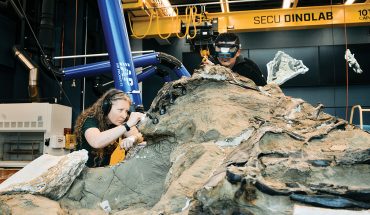 with Billy Warden and Greg Behr
with Billy Warden and Greg Behr
Before the Panthers and Canes, the giants of North Carolina sports were the spandex-wearing, smack-talking, head-cracking heroes and villains of professional wrestling…make that rasslin’. Yeah, there were the basketball and football aces of the ACC. But they were college kids, not stars – not in the wild way Hollywood and rock’n’roll had come to define the term. Rasslers, on the other hand, were larger-than-life, anything-goes alien beings, cosmic muscle masses: Incredible Hulk meets Ziggy Stardust. And Raleigh was a key planet in their rock’em, sock’em solar system.
Jimmy “Superfly” Snuka, 69, flew high with the likes of Rowdy Roddy Piper and Wahoo McDaniel at the Dorton Arena and WRAL’s studio (where the brawlers shot their ’70s’ TV extravaganzas). He chronicles the chaos in his memoir, Superfly. Ricky Morton, 56, of the mid-’80s world champion tag team Rock’n’Roll Express, represented the last great wave of Southern rasslers before the New York-based WWF slapped a headlock on the industry.
Here, Morton (whose head-banging home is in Tennessee) and Snuka (who now nests in New Jersey) tag-team a look back at Raleigh in its rasslin’ heyday…
Raleigh, the family town. Raleigh, the tech town. But tell us about our true glory: Raleigh, the rasslin’ town.
Morton: Lord, have mercy, I had a lot of fun in Raleigh. It was one of the key towns in the wrestling territory down south. When you went to Raleigh, you put a little extra into it. You had to. The fans expected it.
Snuka: Oh yeah, great times in Raleigh. There was nothing like feeling those buildings shake when the fans got into it.
Morton: I’ve wrestled in a lot of towns, and I can’t always remember the details about them. But I remember Dorton Arena. Whenever I get near Raleigh, I can still drive straight to that building, no problem.
And there were always a whole lot of feisty fans waiting for you, yes?
Morton: I’ll tell you, there were a lot of girls. What with the colleges and all. You open the door to leave and you didn’t see two or three girls, you saw 200 or 300. Nowadays, people go to bars to pick up a date. Back then they went to wrestling because that was where the women were.
What would come next? A stop at Hillsborough Street for beers and body slams?
Morton: Oh man, we used to tear up those places. Yeah, we closed down a lot of bars on Hillsborough Street.
Snuka: We wrestled almost every night, so we’d always end up at the hotel together. Getting ready for the next town.
Why was it such a big deal? Aside from your good looks?
Morton: You have to remember: Raleigh – the whole state – was different then. We didn’t have a lot of professional sports. At the Dorton Arena, we’d get people coming in from the beach. Because they wanted to be part of something special and exciting.
Was it all fun? What about the mugs who might feel compelled to show up a pro rassler?
Morton: Sure, that happened a lot. See, we were on TBS…
Ted Turner’s cable network. Back in the day, a self-respecting household had ABC, CBS, NBC and TBS.
Morton: Right. And everyone saw us on TBS. They just couldn’t avoid us. They might act snobby and pretend not to pay attention to wrestling, but everyone knew us. So you’d get guys coming up and getting in your face. What I’d do is introduce them to a girl. After that, they’d be my best friend.
What was it like moving from the down-home wrestling circuits of the south and midwest to the exponentially greater exposure of the old WWF in New York?
Snuka: Madison Square Garden is the biggest venue of them all. No matter the size, every building has a certain feeling. It turned me on and turned right around and turned the fans on, too.
Morton: Back then, we were wrestling for hundreds of folks in the different territories, then when Turner came in we were on TV for thousands. Now, some of these bigger events like Wrestlemania are broadcast to millions of people all over the world.
Raleigh is famous for having so many nice people. We’d love to see some of them turn ‘heel’ – the wrestling industry’s term for a bad guy. How’s it done?
Morton: People in the business tried to make me a heel, but the fans didn’t buy it. I was too all-American. Tell you what, though, heels have to work the hardest. And they’re hugely important to the business. Ric Flair was a great heel because even when he went bad, everyone still loved him.
Snuka: I always wanted to be a heel. All of a sudden the people who once loved you, hated you.
 A lot of folks in Raleigh work in branding or marketing. Wrestlers are all about shaping an image. How’d you do it? Jimmy, you had your signature SuperSplash move from the top rope.
A lot of folks in Raleigh work in branding or marketing. Wrestlers are all about shaping an image. How’d you do it? Jimmy, you had your signature SuperSplash move from the top rope.
Snuka: Yeah, I was a cliff-diver growing up in the Fiji islands. So it came out of knowing how to do that. And it was very different.
Morton: It’s all about giving people something new. When we started Morton the Rock’n’Roll Express, there wasn’t another All-American tag team out there to take on the Koloffs (the fearsome Ivan and Nikita), and walking out to the ring to music like ELO and David Lee Roth.
But after the ‘new’ wears off, you have to keep people coming back.
Morton: Right. That’s where the storylines came in. The soap opera. We all worked really hard together – all of us, Flair, the Midnight Express, everybody – to give the people what they wanted.


